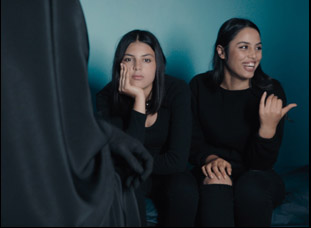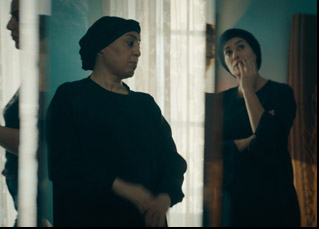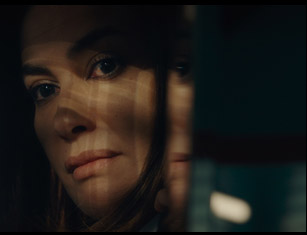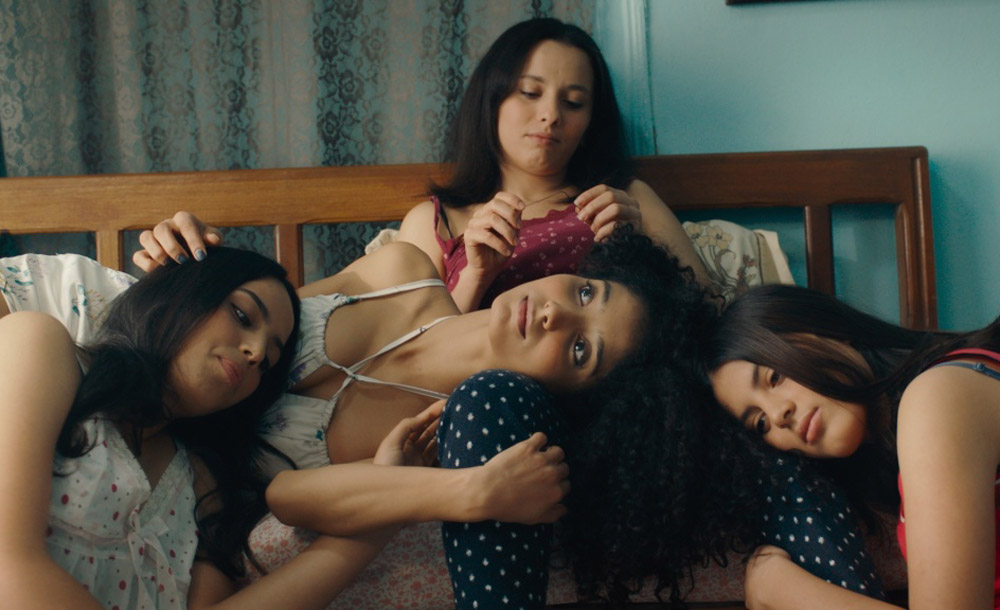Kaouther Ben Hania had been listening to a talk show when she first heard the story of Olfa Hamrouni, a mother of four, two of whom she had lost all contact with when increasing radicalization took hold in their native Tunisia in 2013, exemplified by the assassination of Mohamed Brahmi, a leftist leader whose death plunged the country into political disarray. The story itself may have been relatively straightforward – Hamrouni, a single mother who was giving interviews in an effort to reclaim her lone grandchild by one of her two missing daughters, experienced a divide in her family between her older kids Ghofrane and Rahma who may have been more susceptible to other influences when they tired of her overbearing ways and her younger ones Eya and Tayssir who couldn’t yet know of any alternative but to live under her roof – but the process to do it justice was anything but when to describe only its aftermath would hardly show the ongoing impact it has on all involved. Ben Hania has spared no effort before in seeing such a challenging tale through – while steadily building a reputation as a director of acclaimed dramas such as “Beauty and the Dogs” and “The Man Who Sold His Skin,” she’s carved out time for longitudinal nonfiction, previously spending six years with a Tunisian refugee, starting at age nine, to watch her grow up in Canada in “Zaineb Hates the Snow,” but her work in what would become “Four Daughters” proved to be a challenge unlike any she’d ever had before, trying to have the past, present and future for Hamrouni and her family all co-exist in the same frame as they do in their lives.
“I have always a plan. You can do a movie without writing a proposal, so it wasn’t like a total improvisation,” Ben Hania said recently, having to constantly rethink how to tell Hamrouni’s story over the past six years. “But documentaries are cheaper and I can experiment – when I arrive, I can change the direction of what I’ve thought will be the scene and I can’t do this in fiction.”
That flexibility ended up yielding enthralling results in “Four Daughters,” which has a natural movie star in the headstrong Hamrouni, yet also adds an actress to play her, less so for the purpose of a performance relaying her experience, but for Hamrouni to talk the actress through what she went through un-self-consciously and to give Ben Hania the license to cast two other actresses in the roles of Rahma and Ghofrane to interact with Eya and Tayssir. The family dynamics come alive instantly, and for as much self-reflection and therapy the family has went through on their own before cameras roll, the opportunity to replay scenes from their lives sparks new insights shaped as much by 20/20 hindsight as personal evolution and growth. What also emerges is a remarkable story of a mother whose protection of her daughters in a place where they were seen as particularly vulnerable after their patriarch had left had consequences that she couldn’t fathom for as well-intentioned as it was, with rebellion that initially took the form of goth makeup and punk music curdling into ultra-conservatism and as unbelievable as such a transformation that remains, it becomes all too understandable in a society that has to live in such fear. After premiering at Cannes where it won a Golden Eye prize for best documentary, “Four Daughters” is now representing Tunisia as the country’s official entry to this year’s Oscars and is arriving Stateside this week and Ben Hania graciously spoke about the long road to getting it made, creating the right environment for revelation and how the film is already making an impact off-screen.

Yes, I was filming a more classical documentary, but I understood quickly that it will not take into account or show all the multi-layered aspect of what I felt and what I understood from this story. What was important for me was to understand the past, what happened really behind this tragedy, and there is a cliché in documentaries to represent the past [in] reenactment. I don’t like reenactment, but I thought that I can hijack this concept because it gives me access to the past with actors. But I wasn’t only interested in reenacting the past. I was interested by the fact that Olfa and her daughters can direct those actors so they can summon their past and the actors ask them questions to think about this past. So the idea was to be in the moment, in the memories, and to step back from those memories and to think about their meaning and how things happened really to go to this ugly place with her daughters.
It was a long process, but finally when I had this idea of actors, everything opened. I was struggling even to finance the movie in the beginning [when] the story alone of Olfa and her daughters wasn’t interesting enough. But when I found this way of telling this story, everything went well — I was more comfortable telling this story and we had financing and I was more excited about the project, but Olfa and her daughters were also. I started in 2016, thinking about this project and we finally shot in 2021.
From what I understand, this was an abandoned hotel you filmed in and it was so interesting as a space where you could move out of fictional scenes into places of real interaction like the makeup room. What was it like to figure out?
I knew that it’s an introspective movie, so it’s not about a beautiful, authentic set, but the idea a more mental space, or something at least that can give me a visual unity for the story and also a place where I can go from room to room and change the set for without recreating everything. I saw pictures of this very cheap hotel in Tunis, and I found it beautiful. I loved the blue, and it looked also like some places where Olfa and her daughter lived, so it was perfect. The idea also was not to have all the heaviness of the crew moving from place to place, so the idea was to stay there to form a bubble with the crew, the orphaned daughters and the actors to form really a small family in just one place and to work together in this introspective journey.

During all those years, I became very close to Olfa and her daughters. It was the only person they can talk to that doesn’t judge them because they were like persona non grata in society. So I knew almost everything about their life and when I had this idea, I started organizing memories that I knew so we can shoot them. But still, when we started shooting, I discovered other stuff because their life is so crazy that even they forgot some stuff, so when they started acting in a scene, they’d say, “Oh, now I remember this” and “this happened,” so I discovered many things that I didn’t expect. For example, take the scene of the wedding night of Olfa [where] she remembered what her sister told her, and the actor is telling her, “Come and play your sister.” I [thought], “It will be very complicated. Nobody will understand.” And I’d never heard about the story of the sister, but there were discoveries in the moment and I didn’t say, “Stop. Don’t do this. I’m not prepared.” I was very flexible and adapting everything to their memory and the truth of their souvenir.
I know so many have brought up this remarkable scene to you before, but there’s a moment when Majd, the male actor has to stop a scene because he feels it’s too intense, but Eya and Tayssir explain they’re comfortable because they’ve already processed it. Were you surprised by the impact this process had on the actors?
Yeah, at the moment I was scared. I was asking myself what I’m doing, but I think that his reaction is really normal because he doesn’t have all the background and the relationship I have with the girls. For example, he don’t know that they did their therapy for years and years after going out of the center and he’s an actor, used to playing fictional character, and here he’s confronted with a harsh reality of very intimate confession. So he was confused. He was like, “Kat, what I’m doing here? I’m not a psychoanalyst. I can’t handle with this.” And what was fascinating was the reaction of Eya. She was the one reassuring us that “It’s okay. Don’t be afraid. I’ve told this story before. I want this story to be told.” So it was an interesting moment where I lost control and it was also very intense and very truthful.

Yes, because one can say you need actors for the absent [daughters], so why you are bringing an actress to Olfa? And Olfa is this kind of bigger-than-life character. She talks a lot and when she’s there, she eats [all the attention], and she’s very emotional. And when I am writing fiction and I have a character like this becoming bigger and bigger, I divide it in two characters so I can create a conflict between them. So I told myself I’ll use this [idea] so we can have another Olfa, a more rational Olfa looking to this explosive, emotional Olfa so we can like understand the complexity of this mother and the actor can tell her what she thinks about her, so it was really interesting.
This may be silly to ask when part of what’s remarkable about the film is seeing the present expressed as part of these discussions about the past, but the film’s chronology ends in 2016 and I imagine your experience communicating with the family between then and when you ultimately shot had some significant milestones. Was it obvious what time you wanted the film to cover?
At some point, I wasn’t happy with what I [originally] filmed. I filmed also in 2017, but I found it not up to the level of their story and of all the themes I wanted to address and [I thought], this project is too complex. I can’t handle it,. It’s a minefield. It’s very, very sensitive. Maybe I should not do it, especially when I got nominated for an Oscar with my previous movie, “The Man Who Sold His Skin.” I was obsessed by this project, telling myself, am I that bad director that I can’t find the way to tell this story? And everybody was asking me, “What is your next movie? Will you do an English-speaking movie?” I had a lot of proposals and when I would say, “I have a documentary in Tunisia,” people were like, “Are you crazy?” But when I found the way to tell this story, it was really great and I’m happy that I didn’t stop this project.

Yeah, it was quite intense experience — for me and for them because they don’t even know what Cannes is before this, so it was a special moment and also because Olfa and her daughters are hard to impress. But they took the opportunity to address the Tunisian government so they can bring the granddaughter of Olfa to Tunisia, so it was a very intense moment [for that reason as well]. It was not only about red carpet, but about making their voices heard.
“Four Daughters” opens on October 27th in New York at the IFC Center and Maysles Documentary Center and November 3rd in Los Angeles. You can find a local theater here.




